“Unfortunately, as we made more decisions based on financial issues rather than on what’s right in terms of opportunities for student athletes, I think it will become increasingly difficult to justify what we’re trying to accomplish in intercollegiate sports.”
— Outgoing NCAA President Cedric Dempsey, who delivered the keynote address at the inaugural Intercollegiate Athletics Forum in 2002
 |
Rev. Edward Malloy
Photo by: Mitchell Reibel |
“In my 18 years, there have been only two days that I have been embarrassed to be president of Notre Dame: Tuesday and Wednesday of last week, because I felt we had not abided by our precedent.”
— Rev. Edward Malloy, then president of Notre Dame, on the school’s handling of the firing of football coach Tyrone Willingham (IAF, 2004)
“I am just amazed at how confused the media and our own people on campus are on how we finance intercollegiate athletics and what the role of commercialism is. … What I can’t live with is the general guideline that commercialism is bad and somehow we should rid college sports of it. That makes no sense in the world. It only demonstrates a misunderstanding of how we conduct intercollegiate athletics or any other program in our universities.”
— Late NCAA President Myles Brand (IAF, 2005)
“It’s not a business, damn it. If you think of it as a business, you’re going to
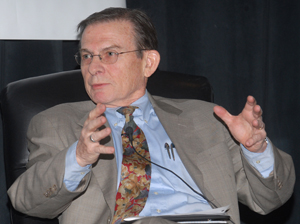 |
Peter Likins
Photo by: Mitchell Reibel |
eliminate the track team and eliminate the volleyball team and focus on those revenue-generating sports. That’s not what we’re about. … The purpose of a university is to maximize social benefits while operating within financial restraints.”
— University of Arizona President Emeritus Peter Likins, taking issue with the classification of college sports as a business (IAF, 2006)
“We’re caught in a world right now where many of us are going to have to look at, ‘Can we afford to still keep doing what we’re doing right now?’ Bottom line, we’re trying to present and provide, for student athletes, as many collegiate experiences from this aspect of their education as we can. I’m not sure that’s possible.”
— Former University of Arizona Athletic Director Jim Livengood, on the finances of college sports (IAF, 2006)
 |
Ari Fleischer
Photo by: Mitchell Reibel |
“There are only two groups I can think of that have [separate] sections in the newspapers … and whose events are covered live on TV: It’s sports and it’s politics — particularly the White House. Nobody else in our society has the pressures, the influence the media can extend upon you and everything you do for a living, because of live events.”
— Former White House press secretary Ari Fleischer, on the similarities between sports and politics (IAF, 2006)
“We play water polo at Michigan. And where do we have to go to find competition? Other than Indiana, we have to get on an airplane and almost all the time, go to the West Coast. And that is a crazy sport for us to have, frankly.”
— Former Michigan Athletic Director Bill Martin, on the idea of placing caps on the number of sports offered at schools (IAF, 2005)
“Twelve million people watched our Labor Day game against Florida State, and
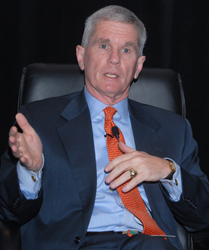 |
James Barker
Photo by: Mitchell Reibel |
that was an opportunity to tell 12 million people about our school. Do you have any idea how long it would take to tell 12 million people about our math department?”
— Clemson University President James Barker (IAF, 2007)
“I never thought I’d see the day where academic centers were part of the arms race.”
— Phil Hughes, then Kansas State associate athletic director for student services (IAF, 2007)
“The tournament in basketball has become so big, so huge that no one, quite frankly, cares about the regular season.”
— Chuck Gerber, then ABC/ESPN executive vice president of collegiate sports (IAF, 2007)
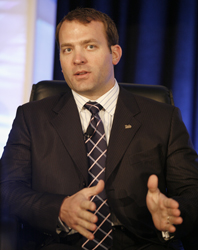 |
Ross Bjork
Photo by: Shana Wittenwyler |
“Our volleyball coach did not want his games streamed because he didn’t want to let other teams scout him online. I’m like, ‘Hey coach, come on. It’s 2008.’”
— Ross Bjork, former UCLA senior associate athletic director for external relations (IAF, 2008)
“If you want a silver bullet, this is it.”
— Bernie Mullin, Aspire Group principal, holding up his smartphone during a discussion on sources for new revenue in college sports (IAF, 2009)
“I had a teacher once in an advanced senior history course. There were 22 of us. One guy got an A, I got a B and four people got C’s. Everybody else failed. And he [the teacher] was so happy. If I coached like that, I wouldn’t be here. I don’t think it’s a mark of a good teacher when people flunk. I think it’s a mark of a pretty piss-poor teacher. … If my players aren’t doing what we need to do to win, I’m not doing a good job.”
— Syracuse basketball coach Jim Boeheim, on the pressure on college coaches to win (IAF, 2006)
“I am a university president. I have a responsibility for all of our students. I have a responsibility to academic integrity. I do not have a responsibility to entertain people for 3 1/2 hours on a Saturday afternoon and this is what is happening. We have corrupted the system and I have been part of that corruption.”
— Former Vanderbilt University Chancellor E. Gordon Gee, on why he folded his athletic department (IAF, 2004)
“One email said, ‘You have ruined my life.’ Another one said, ‘You have ruined
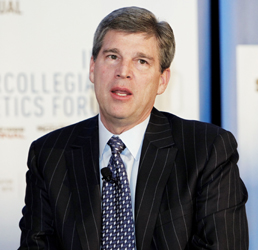 |
David Brandon
Photo by: Shana Wittenwyler |
my family.’ Those are a tremendous testament to the emotional connection people have with that game.”
— David Brandon, Michigan athletic director, on feedback he received over the possibility that Michigan would not play Ohio State in the last game of the season (IAF, 2010)
“When you step back and look at it, you have to say, ‘Isn’t there something wrong with this system when assistant coaches are getting paid twice as much as the faculty that serve the institution?’”
— Brit Kirwan, University System of Maryland chancellor (IAF, 2009)
“Don’t put that in a contract unless there’s a gun to your head.”
— Sandy Barbour, Cal-Berkeley athletic director, when asked how to deal with a situation in which a coach has in his contract that a new stadium will be built by a certain date (IAF, 2010)
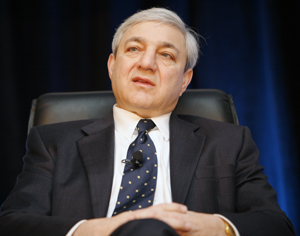 |
Graham Spanier
Photo by: Shana Wittenwyler |
“It is at least 10 percent of my time and two-thirds of the psychic energy that is expended. Of course, 90 percent of that is about Joe Paterno.”
— Graham Spanier, then president of Penn State University, when asked about how much of his time in a typical day is spent on athletics (IAF, 2008)
“We accept the fact that African-Americans can play basketball and coach it; but we’re saying to ourselves that we can play football, but they can’t coach it, too.”
— Floyd Keith, executive director of the Black Coaches Association, on a report showing that African-Americans made up about 23 percent of Division I basketball coaches, but fewer than 4 percent of Division I-A football coaches (IAF, 2005)










